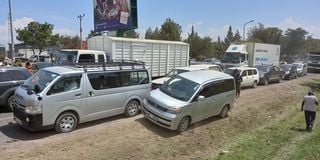Premium
Someone should study traffic jams in Kenya for their PhD thesis

Motorists stuck in traffic jam along the busy Nairobi-Nakuru highway on June 26, 2021.
I was on my way to a meeting last weekend when I was caught up in a traffic jam caused by what I would realise, to my amazement, was a very minor accident, yet it had caused a gridlock that extended from here to Timbuktu. Seriously, someone should study traffic jams in Kenya for their PhD thesis.
Anyway, afraid that I would arrive at my rendezvous late if the jam didn’t ease up in the next few minutes, I dipped my hand into my handbag for my phone, so that I could check the time – I abhor tardiness.
A couple of seconds of fishing around yielded nothing, yet I was pretty sure that my phone was somewhere in there. Eventually, I decided to use my eyes too, since the snaking line of cars hadn’t moved an inch five minutes and counting.
But no matter how hard I looked and energetically sifted through the many contents of my handbag, my pointed search didn’t yield my phone. By then I had begun to sweat, thanks, in part, to anxiety, as well as the energy that had gone into the search for my elusive gadget.
Afraid that I had left this modern world’s basic need at home, I decided to empty the contents of my handbag on the seat for a more thorough search. To my relief, I finally unearthed it somewhere in the midst of the small mountain of things that had tumbled out of my bag, ranging from last year’s supermarket receipts, a handkerchief I didn’t know I had, an assortment of pens that could stock a kiosk, rubber bands, a toy car with a missing wheel, wads of tissues, one shoelace, three mint sweets (the ones hawkers sell in traffic), which I was sure were expired because I couldn’t remember buying them, and, wonder of wonders, a plastic spoon, among the usual – hand sanitiser, spare surgical mask, purse and earphones – I really should be emptying my handbag more often. Thankfully, my phone assured me that I had 30 minutes to get to the meeting.
Comical situation
It is only much later that I realised that all along, I was wearing a watch which works just fine, and that I could have saved myself that comical situation by simply referring to my wrist watch. But I never seem to remember that I have one, even though I faithfully wear one, out of habit, whenever I step out of the house.
I own two wrist watches, but since I got a mobile phone, I never use them to tell the time, my phone having firmly taken over this role, relegating my watches to non-functional items that are only good to look at.
There is no doubt that the technology embedded in our phones has changed how we do things and rendered some things we once valued obsolete, such as calendars, calculators, diaries, alarm clocks, heck, even face-to-face meetings with colleagues, relatives and friends.
If visiting a new place, for directions, all you have to do is switch on Google Maps and key in the location, though I have refused to adapt to this modern method of getting to a destination.
You see, I am utterly hopeless when it comes to direction, even when someone is guiding me every step of the way. I, therefore, find this app close to useless. I trust the old way more, flesh and blood people that have actually been there, that is why I still walk up to watchmen guarding buildings in town to ask where a certain building is located, and still stop by the roadside to ask a passerby or a shopkeeper whether I’m headed in the right direction.





